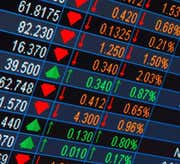When many outsiders picture the world of finance, the image of the busy (and at times frantic) stock trader comes to mind. In actuality, a career as a stock trader can be profitable, gratifying, and enjoyable. There are dozens of different types of stock traders, each with a somewhat different area of focus and style. If you’re considering a career as a stock trader, it’s a good idea to learn about these various options and to see which type of stock trader you may want to become. Finding the right fit depends upon your personality, the amount of time you’re able to dedicate to the work, and the amount of capital you have available for investment, among other factors.
Growth, Value, or Income?
Traders usually focus on one or more areas involving growth, value, or income building, depending upon the level of risk they’re willing to take on.
-
Growth-centered trading entails the buying of stock in companies that the trader believes are likely to grow, thereby expanding their profits. Trading of this kind sometimes focuses on new companies with rapid growth potential. When a company grows, its stock rises in value, and the trader holding shares reaps a profit. There are, of course, risks associated with growth-centered trading as well, including the possibility that an initial public offering (IPO) may collapse or fail. For this reason, it’s essential that growth-centered traders be as well-informed as possible and have the confidence to trust their instinctive reactions.
-
Value-focused investing involves a trader watching out for stocks that he or she believes are undervalued. Companies that are not performing up to their potential, but which could turn around their business or reputation in order to perform better are likely targets. One way that value-focused investors seek these companies is to look across a sector or industry and find companies with shares that are priced significantly lower than the shares of their competitors. Of course, there is always the possibility that a potential value company has artificially suppressed the price of its stock, which may be a problem and which increases the level of risk of this type of trading.
-
Income-oriented investing remains the most conservative form of popular stock trading. This type of trading aims to maintain capital, so traders tend to look for companies with low price fluctuations. Income-oriented styles tend to focus on the biggest companies and those enjoying stellar reputations, on the assumption that those companies will continue to dominate their peers and grow steadily, if not rapidly. For this reason, income-oriented investors look for blue chip stocks above others. This is the least risky type of common trading, and it is supplemented by the use of bonds and time deposits, as well as a focus on companies with good market positions, established management, and solid cash flow.
When looking through the various chapters of this tutorial, keep in mind that there are a huge number of stock exchanges and investors around the world. It’s worthwhile to keep in mind the following rule: “For every one buyer there must be one seller.”
Nearly all of the types of trading strategies outlined in the chapters to come may be profitable. However, profitability is not so simple as just picking the best stock. There are complicated rules and strategies which the most skilled and successful traders take into account. It’s also likely that many of these top traders adopt a number of the strategies you’ll see in the pages to come, depending upon their interests, risk tolerance, and the performance of the broader market.
Beginning stock traders tend to feel an exceptional amount of pressure when faced with the tough and quick decisions of the industry. One tool for helping to deal with this trepidation is to analyze the strategies and experiences of successful investors and traders. The other key is to allow yourself the opportunity to make mistakes; by experimenting with different strategies and in scenarios without a great deal at stake, you’ll learn which modes of investing work best for you.
Stock Traders’ vs. Stock Investors' Roles in the Marketplace
-
 Investing
InvestingFundamental Analysis for Traders
Find out how the fundamental analysis method can be applied strategically to increase profits. -
 Trading
TradingWhat Type Of Forex Trader Are You?
Timing may be the key to uncovering your true strength as a forex trader. -
 Trading
TradingUse Price Action Trading Strategy for Results
Bored by the fixed rules of technical and fundamental analysis? Price action trading allows you to customize your own trading strategy. -
 Trading
TradingDay Trading: An Introduction
This article takes an objective look at day trading, who does it, and how it is done. -
 Trading
TradingDebunking 8 Myths About Technical Analysis
Here are common myths about technical analysis. -
 Investing
InvestingTechnical Vs. Fundamental: Friends or Foes?
Experienced investors debate which one—fundamental or technical—provides higher returns.



